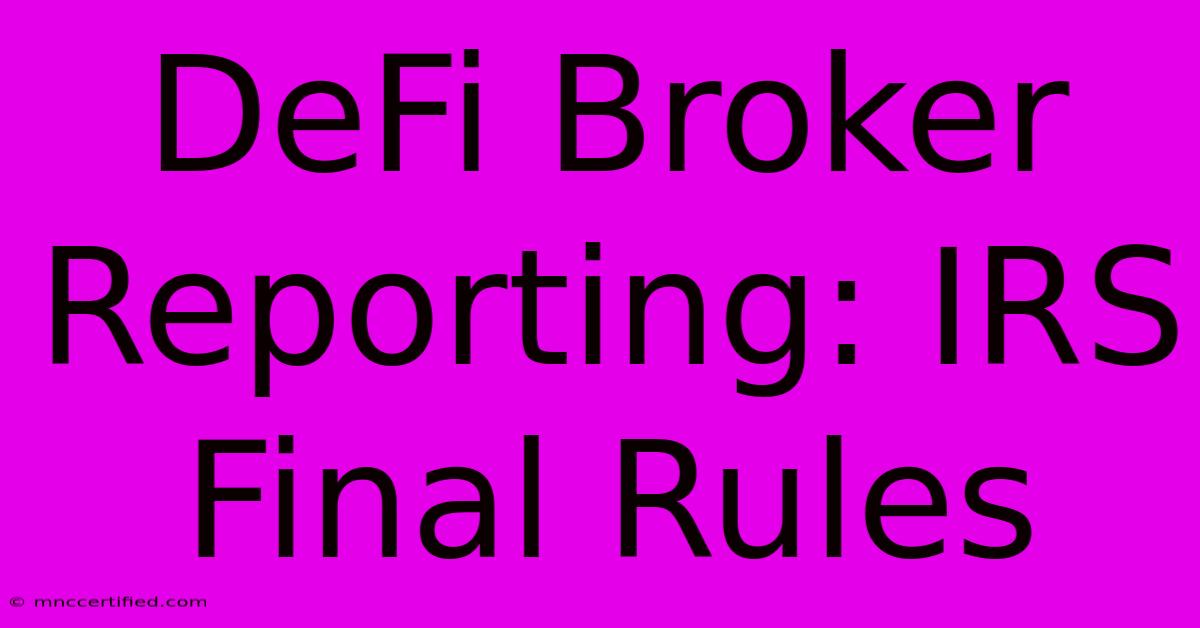DeFi Broker Reporting: IRS Final Rules

Table of Contents
DeFi Broker Reporting: IRS Final Rules – What You Need to Know
The IRS recently released its final rules regarding the reporting requirements for brokers involved in decentralized finance (DeFi). These rules, part of the broader infrastructure bill passed in 2021, significantly impact how DeFi platforms and related businesses operate in the US. Understanding these regulations is crucial for compliance and avoiding potential penalties. This article breaks down the key aspects of these final rules, focusing on what you need to know to navigate this complex landscape.
What Constitutes a "Broker" under the New DeFi Reporting Rules?
The IRS definition of a "broker" within the context of DeFi is broad and encompasses a wide range of entities. It's not limited to traditional brokerage firms. Instead, it includes anyone who facilitates the exchange of digital assets, even indirectly. This includes, but is not limited to:
- Decentralized Exchanges (DEXs): Platforms like Uniswap, SushiSwap, and others that allow peer-to-peer trading of cryptocurrencies without intermediaries are potentially subject to these rules. The complexity lies in determining how much control a DEX operator exerts over the platform and the transactions facilitated.
- Automated Market Makers (AMMs): These algorithmic systems, which form the backbone of many DEXs, may also fall under the broker definition, depending on their level of involvement in transaction execution and record-keeping.
- Custodial Wallets: Services that provide custody and management of digital assets for users could also be classified as brokers.
- Other DeFi Platforms: A vast array of DeFi protocols that involve the exchange or transfer of digital assets could potentially be classified as brokers. This includes lending and borrowing platforms, yield farming platforms, and other services that facilitate cryptocurrency transactions.
The key takeaway here is that the IRS's definition of a "broker" in the DeFi space is intentionally broad and aims to capture a wide net of entities. Determining your specific classification requires careful analysis of your platform's operations and the role it plays in facilitating cryptocurrency transactions.
Key Reporting Requirements for DeFi Brokers
The final rules mandate that brokers must report specific information to the IRS concerning their users' transactions. This includes:
- Identity Information: Brokers need to collect and report taxpayer identification numbers (TINs) and other identifying information of their users.
- Transaction Details: This includes the date, amount, and type of each transaction involving digital assets.
- Gain or Loss Information: Brokers must calculate and report the realized gains or losses from transactions made on their platforms.
Failure to comply with these reporting requirements can result in significant penalties, including substantial fines and legal action.
Challenges in Implementing DeFi Broker Reporting
Implementing these reporting requirements presents significant challenges for DeFi platforms:
- Pseudonymity and Privacy: Many DeFi platforms operate based on pseudonymous identities, making it difficult to collect the required personal information from users.
- Decentralized Nature: The decentralized nature of DeFi makes it difficult to track and monitor transactions across various blockchains and protocols.
- Technological Complexity: Building the necessary infrastructure to collect, process, and report the required data requires significant technical expertise and investment.
Navigating Compliance: Best Practices for DeFi Platforms
Given the complexities of the IRS's final rules, DeFi platforms need to take proactive steps to ensure compliance. These include:
- Legal Counsel: Seeking advice from experienced legal professionals specializing in tax and cryptocurrency regulations is crucial.
- Technical Expertise: Investing in the necessary technology and infrastructure to collect and report data is essential.
- User Education: Clearly communicating the new reporting requirements to users and providing necessary guidance is vital.
- Ongoing Monitoring: Staying updated on changes to regulations and best practices is crucial for long-term compliance.
Conclusion: The Future of DeFi and Regulatory Compliance
The IRS's final rules on DeFi broker reporting represent a significant step towards regulating the rapidly evolving DeFi ecosystem. While these regulations present challenges, proactively addressing them is crucial for ensuring long-term sustainability and avoiding legal ramifications. By seeking expert legal and technical advice, investing in compliant infrastructure, and communicating transparently with users, DeFi platforms can navigate this new regulatory landscape and continue to innovate within the bounds of the law. The future of DeFi hinges on successful adaptation to these evolving regulatory requirements. Ignoring them carries substantial risks.

Thank you for visiting our website wich cover about DeFi Broker Reporting: IRS Final Rules. We hope the information provided has been useful to you. Feel free to contact us if you have any questions or need further assistance. See you next time and dont miss to bookmark.
Featured Posts
-
Winter Village Kiosk Fire
Dec 28, 2024
-
North Korean Pow Dies From Wounds In Ukraine
Dec 28, 2024
-
Kessler Syndrome Threat Are We Prepared
Dec 28, 2024
-
Kris Marshall And Beyond Paradise Xmas Cast
Dec 28, 2024
-
Syracuse Washington State Game Prediction 2024 Holiday
Dec 28, 2024